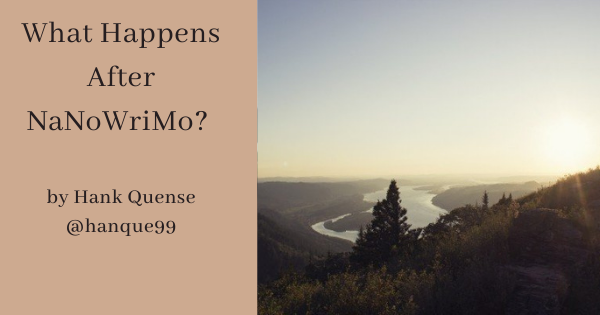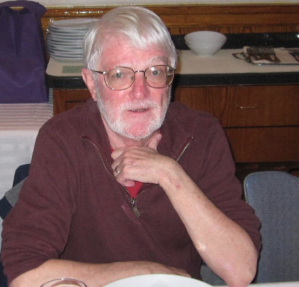by Hank Quense, @hanque99
Once your NaNoWriMo project is completed, it’s time to start thinking about what to do with the manuscript you just finished writing.
Of course, the first thing you have to do is revise it (right?). And keep revising it until it’s a polished gem. Once those revisions are completed, it becomes decision time: what happens now? There are several possibilities here.
- File it and forget it.
- Try for an agent and/or a traditional publisher.
- Sign up with a service company
- Self-publish it.
Let’s explore each of these options.
File it and forget it:
What? After all that hard work and sweat during an entire month? You have to believe in yourself! You have to believe your manuscript is great and that someone (even lots of someones) wants to read it. I recommend you don’t stick it in your sock drawer and forget about it. Try one of the other choices listed. You can have a successful published book!
Try for an agent and/or a traditional publisher:
This is popular option and many writers try this as their first choice. This route can take a long time, possibly years. Some of the big publishers now accept submissions without an agent and that simplifies matters if the publisher is a match for your manuscript. Indie publishers offer a slightly different path. Most of these smaller publishers don’t relay on agents so it’s easier to get in touch with them. Generally, the smaller indie publishers are more open to new authors and have much shorter intervals
The big advantage with this option is the publisher does all the work and incurs all the expenses involved with producing the book.
Sign up with a service company:
These service companies seem to be a growth industry. They’re popping up all over the landscape and they have some controversy surrounding them. Their basic method of operation is you pay them to produce and publish the book. That is the exact opposite of the previous option. The cost to the author isn’t pin money either, its thousands of dollars. Granted for that money, the service company does a lot of work. It comes up with a cover, edits the manuscript, formats the book and attends to all the other details involved in the publishing process.
My concern about the service companies is this: vanity presses do the same thing. So why are service companies different from vanity press publishers? I haven’t heard a satisfactory answer to this question and until I do, I won’t be a service company fan. I guess if you have the money to spend on this option, it’s something to consider although I’m more than a bit leery of the whole concept of services companies.
Before you decide to use a service company, make sure you read all the fine print on all the web pages and especially on any contracts. If you have a question, don’t sign until the question is answered to your satisfaction. Don’t accept any fancy double-talk.
Self-publish it:
This option is increasingly popular with authors, both newbies and established.
An inexperienced author who considers self-publishing her book will often take to the internet to the research the process. That’s when problems set in. There is a lot of great information available on the web. Unfortunately, there is also a lot of mis-information and other material that is simply wrong. The issue for the newbie author is figuring out which information is accurate and which isn’t.
An example of wrong information is the advice to take your unrevised and unedited manuscript and upload it Kindle. This produces the kind of book that gives self-publishing a bad reputation. It also indicates a complete lack of understanding on what self-publishing is all about. In a nutshell, self-publishing means that the author is the publisher and as such must do all the work a publisher would do if the author sold the book to the publisher. Here is a short list of the work involved in self-publishing the book: getting a unique cover, having the manuscript professionally edited, designing the layout and formatting the book. This last item is especially important in the case of ebooks because what you see on your computer screen is most likely not ebook compliant. Ebooks must be formatted in accordance with the Epub3 Standard and word processor default settings assume you will print the material. Hence, these settings aren’t complaint with the Epub3 Standard.
Another nasty situation that can arise is with the scam artists that cruise the internet searching for new and/or inexperienced authors. The scammers will make attractive offers that do nothing except drain your wallet.
One solution to this information conundrum is to get a mentor: an experienced self-published author who can offer advice on a number of issues that will pop up during the publish process along with the decisions that have to be made. Another solution is to ignore most of the internet information and read a good book on the subject.
===============
For NaNoWriMo (and other first time authors) my Self-publishing Starter Kit offers a way to rapidly gain an understanding of what self-publishing entails. The Starter Kit is a bundle of four videos. The videos cover an overview of self-publishing, a first step in marketing the book, ebook formatting and scams an author can run into. You can learn more about the Self-publishing Starter Kit at: https://www.writersarc.com/self-publishing-starter-kit
Hank Quense writes satirical fantasy and sci-fi. Early in his writing career,
he was strongly influenced by two authors: Douglas Adams and his
Hitchhiker’s Guide to the Galaxy and Joseph Heller’s Catch-22. Happily, Hank
has never quite recovered from those experiences.
He lives with his wife in northern New Jersey, a mere 20 miles from
Manhattan, the center of the galaxy (according to those who live in
Manhattan). They have two daughters and five grandchildren all of whom
live nearby.
Choices for Writers After NaNoWriMo by @hanque99 : Share on X
Photo on Visual hunt


Thanks for this post, Hank, which lays out writers’ options very nicely! I didn’t officially NaNo this year, but I did finish 2 projects and an outline, so I was more productive than usual.
I’ve never done a NaNoWriMo. My writing method is to write one scene a day and not worry about the word count. I”d need four or five months to complete the NaNo stuff
Great tips, Hank. Self-publishing is a scary way to go but so much better than the service companies. Smaller, independent publishing companies offer new authors so much.
Self-publishing is like any other project. If you learn to do it the correct way, it isn’t all that difficult. Time-consuming , yes, but not necessarily difficult.
It’s good to think clearly about the options we have with our finished manuscripts. I think this is where we carefully explore the options, see which publishers might be looking for the kind of story we have, talk to people who self-publish about the realities of doing that, etc… In other words, we do the research and find out where the story fits. Thanks for laying this all out.
Doing the research is probably more demanding than writing the novel. And definitely not as much fun.
Fortunately both of my NaNo projects turned into books published by my publisher.
Hi Elizabeth – that’s great Hank has let us into the work that needs to be done for self-publishing … I’m not in that position – but having someone we can trust, via bloggers we can trust is so helpful … wonderful – thanks to you both – stay safe and all the best – Hilary
Thanks for your kind comments. Venturing into new projects without doing the proper research leads to expensive mistakes
If it looks like a vanity press, avoid it. I’d say the same thing with hybrid publishers where the author pays for some of the services.
I think many hybrid publishers are vanity presses in disguise to lure the gullible into signing up with them.
Good advice. There are so many scammers out there looking to prey on the hopes and dreams of others.
I do stick my stories in a drawer – but not permanently. I need a couple of months away from the story in order to revise. I self-pubbed a few of my previous NaNo stories this year. This NaNo will be book 7 in that series :)
Good summary and crash course, especially for beginning authors completing their first book. A great refresher, too :)
What happened to the option #6? “Putting down your pen and refusing to do anything writing related for an entire month.” That’s what I’d probably do, which is probably one reason I don’t do NaNo anymore.
I participated but more of a general outlining plotting and pantsing. But overall very productive and I’m a lot more organized moving forward.
Great information. I only wrote one year signed up for the NaNoWriMo. After that, I’ve unofficially wrote three separate years to get started on book ideas. I haven’t finished any of them, but for now I have the bones.
Teresa